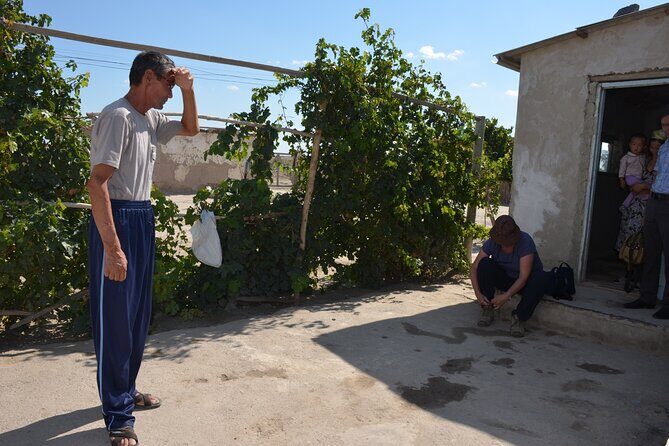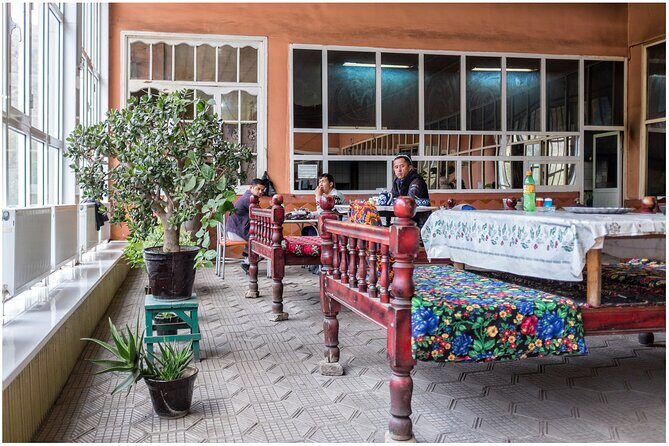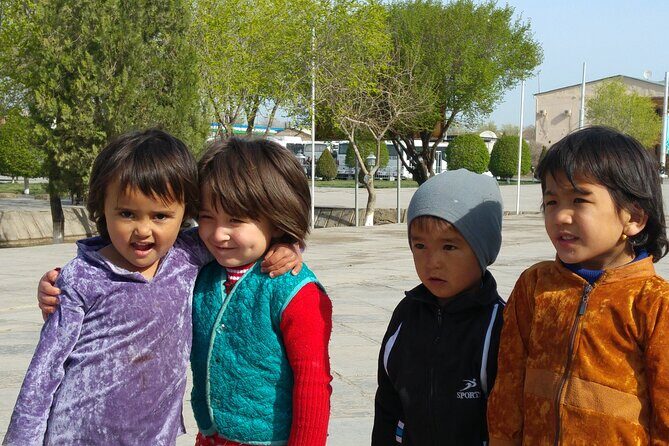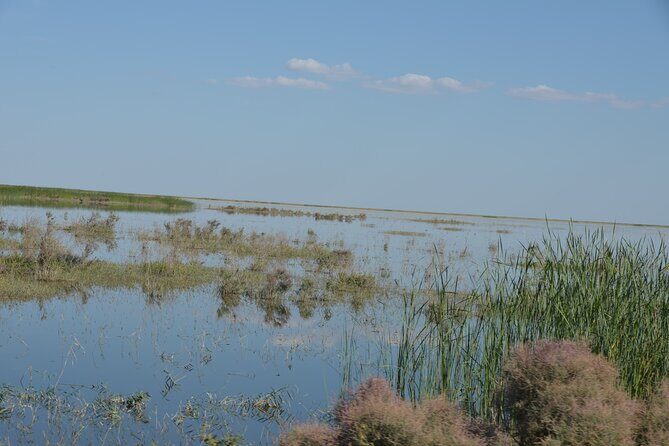A Genuine Look at Uzbek Rural Life: The Private Cotton Village Tour

If you’re after an experience that takes you beyond the usual tourist spots in Uzbekistan, this private visit to a former kolkhoz (Soviet collective farm) near Samarkand offers a rare glimpse into rural life. Priced at $90 per person and lasting about 10 to 11 hours, this tour is tailored for those curious about local traditions, the agricultural backbone of Central Asia, and the everyday stories of village folks. Your guide will pick you up—most likely at your hotel—and take you on a journey through cotton fields, river basins, local farms, and a school where French is still being taught.
What we love about this experience? First, the chance to walk through cotton fields and see the harvesting or planting depending on the season—an authentic view of Uzbekistan’s most famous crop. Second, the heartfelt home-cooked lunch shared with a local family, which is often a highlight in such cultural excursions. A potential consideration? The day involves quite a bit of walking, especially along the river basin and farms—so comfortable shoes and a good level of stamina are advisable.
This tour suits travelers with a genuine interest in rural life, water issues, or local agriculture, and those eager to connect with regional people in an informal setting. It’s perfect for travelers who enjoy immersive experiences, like meeting students learning French or visiting small farms. If you appreciate authentic, off-the-beaten-path outings with a personal touch, this tour should be on your list.
Key Points

- Authentic Rural Experience: Walk through cotton fields and meet local farmers, gaining insight into Uzbekistan’s agricultural practices.
- Cultural Interaction: Share meals and conversations with village families and, if arranged, meet French-speaking students.
- Educational Value: Learn about water issues in Central Asia by exploring the Zeravchan River basin and its dry riverbed.
- Local Production: Visit fish and bee farms, including a honey farm specializing in cotton honey.
- Seasonal Activities: Depending on the time of year, see cotton picking, silkworm breeding, or other seasonal tasks.
- Comprehensive Day: The tour combines cultural, agricultural, and environmental perspectives for a well-rounded experience.
Prefer personalized experiences? Here are other private options we've covered in Samarkand
In-Depth Review: Walking Through Cotton and Village Life
The First Stop: Payshanba Bazar
Your day begins with a visit to Payshanba Bazar, a lively market held every Thursday from dawn until early afternoon. Here, you encounter authentic Uzbek life—local farmers selling livestock and produce, villagers bargaining over colorful textiles, and the smell of fresh herbs filling the air. This is a lively, unfiltered slice of local commerce that sets the tone for the day. The market’s vibrant atmosphere is a vivid reminder of how central such bazaars are to Uzbek social and economic life.
The Village and the Zeravchan River
Around 10 a.m., you’ll arrive at a quaint village, greeted warmly by a local family over a cup of traditional welcome tea. This personal touch, offered by your hosts, makes the experience feel genuine and intimate. We loved how this keeps the experience rooted in real-life interactions rather than a staged tour.
From there, you walk about 4.5 km along the dry basin of the Zeravchan River, which illustrates a critical issue in Central Asia—water scarcity. Most of the river’s waters are diverted for irrigation, leaving the basin dry much of the year. You’ll see the irrigation channels, the crops in the riverbed, and the fish farm that depends on the water available. This walk is not just about scenery; it’s an eye-opener about how water shortages impact agriculture and daily life here.
Lunch with a Local Family
After the walk, you’ll sit down for a traditional Uzbek lunch with the family—most likely featuring plov (pilaf), bread, and seasonal vegetables. This meal, served in a home setting, is often noted as a highlight—delicious, generous, and served with genuine hospitality. As one reviewer put it, sharing this meal and the family’s warmth creates a lasting memory.
Cotton Fields and Seasonal Insights
Post-lunch, your journey continues into the cotton fields, which stretch as far as the eye can see. Depending on the season, you’ll observe different stages: sowing in April, flowering in early June, or harvesting in September and October. If you visit during cotton picking season, you can witness locals gathering the fluffy fiber, a process that’s both labor-intensive and vital to Uzbekistan’s economy.
You also visit a cotton honey farm, where the beekeeper produces honey flavored with cotton nectar. This unique product is a testament to the diversity of local agriculture.
Visiting a Rural School
A special feature of this tour is a potential visit to Ishtixon Tuman’s school that still teaches French. This offers a fascinating look at education in rural Uzbekistan. You’ll need to coordinate in advance, but the chance to meet students and see their classrooms adds an unexpected educational layer to your trip. As one reviewer noted, meeting the children and their teachers was “très enrichissante” (very enriching).
End of Day
After a full day of walking, talking, and tasting, your guide will whisk you back to Samarkand. Most travelers find this day both eye-opening and emotionally rewarding—an authentic glimpse into the lives of Uzbek farmers and villagers.
The Practicalities: What You Need to Know

Price and Value
At $90 per person, this tour offers a well-rounded package that includes private transportation, a French- or English-speaking guide, and a home-cooked lunch. Compared to typical day trips, it provides a personalized experience that genuinely connects you with local people and their environment. The price reflects the depth of interaction and the unique access to rural life, which is often hard to find in larger group tours.
Duration and Comfort
Long days of walking—totaling about 8 hours of activity—mean you should be comfortable with a lot of standing and wandering. The tour includes significant outdoor exposure, so weather considerations are important. Most travelers would find it manageable with good shoes and sun protection.
Booking and Flexibility
Advance booking is recommended, especially if you’re interested in the school visit or seasonal activities. The tour is private, so it can be tailored somewhat to your interests. Cancellation is free up to 24 hours before, offering peace of mind if weather or plans change.
Who Will Appreciate This Tour?
Travelers who enjoy authentic cultural encounters, agricultural insights, and environmental issues will find this tour highly rewarding. It’s ideal for those willing to step outside typical sightseeing to meet local people and see everyday life. History buffs may find the water basin and cotton fields revealing, while food lovers will enjoy the home-cooked Uzbek meal.
This experience is less suited for travelers seeking luxury or very relaxed days—be prepared for a fair amount of walking and direct interaction. It’s perfect if you’re curious about the real Uzbekistan, not just its monuments, and want a meaningful connection with its rural communities.
Final Thoughts: Is This Tour Right for You?
If you’re eager to see Uzbekistan through the eyes of its farmers, this tour delivers excellent value and genuine encounters. The combination of walking through cotton fields, meeting villagers, and sharing meals creates a personal and educational experience that’s hard to beat. It’s especially meaningful if you want to understand the water issues affecting Central Asia or learn about the local economy beyond tourism.
While it might not be suited for those with limited mobility or very tight schedules, the memories you’ll bring home—of warm family welcomes, aromatic home-cooked dishes, and vast cotton fields—are priceless. This is a rare chance to see the rural heart of Uzbekistan in an intimate, respectful way.
FAQ

Is the tour suitable for all ages?
Most likely, yes. However, because of the walking involved, it’s best for travelers comfortable with outdoor activity and uneven terrain.
How much walking is involved?
You’ll walk about 4.5 km along the river basin and additional shorter distances in the fields and farm visits.
What should I wear?
Comfortable walking shoes are essential. Light, breathable clothing and sun protection are advised, especially in summer months.
Is lunch included?
Yes, you’ll enjoy a traditional Uzbek meal prepared in a family setting, often featuring plov and seasonal vegetables.
Can I meet French-speaking locals?
Yes, if arranged in advance, you can meet students learning French at a local school, adding a unique educational aspect.
What’s the best season to visit?
Depending on what you want to see—cotton harvesting in September/October or cotton planting in April—the experience varies. The experience is seasonal.
How long in advance should I book?
Most travelers book about 61 days ahead, to secure the date and coordinate special visits like the school.
Are personal expenses included?
No, extras like souvenirs or additional snacks are not covered.
Is transportation private?
Yes, transportation is private and air-conditioned, ensuring comfort during the long day.
What if the weather’s bad?
The tour requires good weather; if canceled, a different date or full refund is offered.
This tour strikes a rare balance of culture, environment, and personal stories. It’s an authentic taste of rural Uzbekistan that provides meaningful insights and memorable moments. Whether you’re a curious traveler or a dedicated cultural enthusiast, this experience offers a genuine connection to the land and its people.
More Private Tours in Samarkand
More Tour Reviews in Samarkand
More Samarkand experiences we've covered
- Day Tour to Shahrisabz of Amir Timur
- From Samarkand: Panjakent and Seven Lakes 2-Day Tour
- Penjikent Day Trip From Samarkand
- From Samarkand: Tajikistan and Panjikent – day trip
- Samarkand: Historical City Highlights Guided Walking Tour
- A City Tour Of Samarkand: The Pearl Of The East
- One Day Tour of Seven Lakes in Tajikistan from Samarkand
- Seven Beauties Of Shing Haftkol Tour From Samarkand
- Private Day Trip to Shakhrisabz from Samarkand
- Tashkent: 5-day tour, Tashkent, Amirsoy resort and Samarkand
- Samarkand: Cooking class with local family
- Full Day Private Tour in Seven Lakes from Samarkand
